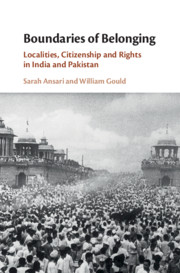Book contents
- Boundaries of Belonging
- Boundaries of Belonging
- Copyright page
- Epigraph
- Contents
- Figures
- Acknowledgements
- Abbreviations
- Maps
- Introduction
- 1 ‘Performing the State’ in Post-1947 India and Pakistan
- 2 People on the Move
- 3 Citizens and the City
- 4 New Constitutions, New Citizens
- 5 Women and Differentiated Citizenship in Postcolonial South Asia
- 6 ‘Hidden Citizens’ in 1940s and 1950s India and Pakistan
- Epilogue and Conclusion
- Glossary
- Bibliography
- Index
5 - Women and Differentiated Citizenship in Postcolonial South Asia
Published online by Cambridge University Press: 17 October 2019
- Boundaries of Belonging
- Boundaries of Belonging
- Copyright page
- Epigraph
- Contents
- Figures
- Acknowledgements
- Abbreviations
- Maps
- Introduction
- 1 ‘Performing the State’ in Post-1947 India and Pakistan
- 2 People on the Move
- 3 Citizens and the City
- 4 New Constitutions, New Citizens
- 5 Women and Differentiated Citizenship in Postcolonial South Asia
- 6 ‘Hidden Citizens’ in 1940s and 1950s India and Pakistan
- Epilogue and Conclusion
- Glossary
- Bibliography
- Index
Summary
As Chapter 5 explores in relation to both UP and Sindh, and in India and Pakistan more widely, the status of women as new citizens was keenly contested, and women’s movements on both sides of the border in the first decade following Independence were caught up in the search for ways of balancing universal notions of citizenship alongside female mobilization. Women’s organizations in the late 1940s and early 1950s in both places engaged with the idea of group rights, in the main, through juggling liberal universal notions of citizenship on the one hand and movements for grassroots feminist mobilization on the other. Likewise, this was also a question of scales of mobilization: the often difficult relationship between local movements and regional, national or international ones, was also part and parcel of the challenges faced by women more generally, not least around problems of political representation.
Keywords
- Type
- Chapter
- Information
- Boundaries of BelongingLocalities, Citizenship and Rights in India and Pakistan, pp. 181 - 222Publisher: Cambridge University PressPrint publication year: 2019

